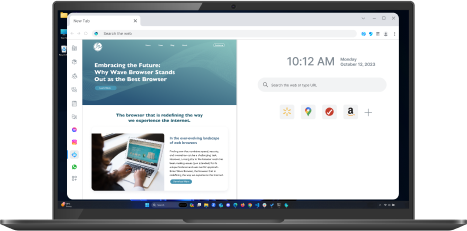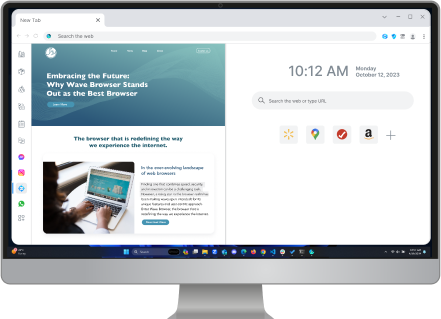5 Common Myths About Private Web Browsing Debunked
Table of Contents

In a world where personal data breaches and online tracking have become all too common, protecting your online privacy has never been more important. A private browser is often touted as a solution, but what exactly does it do? And can it really keep you safe from prying eyes?
In this blog, we will debunk the myths surrounding private browsing and reveal the truth behind its effectiveness. We will also explore additional measures you can take to enhance your online privacy beyond using the best private browser.
From ad-blockers and password management to privacy-focused search engines and encrypted messaging extensions, we will provide you with a comprehensive guide on how to safeguard your online activity and digital footprint. Don't let misconceptions fool you - empower yourself with knowledge of private browsing myths and take control of your online privacy today!
Enhancing online privacy beyond private browsing

While a private web browser, often referred to as incognito mode on Google Chrome or InPrivate mode on Microsoft Edge, can prevent your online activity and browsing history from being saved on your device, it's important to understand the limitations of even the most private browser in enhancing online privacy and browsing security.
Despite using a private internet browser or opening a private window, your internet service provider and websites can still access your personal data and track your online activities.
To go beyond a private browsing session, consider additional browser security measures such as using a virtual private network (VPN) or privacy browser extensions. VPNs encrypt your internet connection, making it harder for others to track your online activity and browsing habits. Additionally, browser extensions that specialize in privacy protection can block trackers, phishing attempts, and malicious ads. By taking these additional steps, you can further protect your online privacy.
Role of ad blockers and tracking protection extensions

Ad-blockers and tracking protection extensions play a vital role in enhancing online privacy. By blocking advertisements and preventing websites from tracking your browsing activity, these tools help protect your personal information and prevent targeted advertising.
Ad-blockers remove annoying ads that can slow down your browsing experience and potentially track your online behavior. Meanwhile, tracking protection extensions block third-party trackers often used by advertisers to collect data about your interests and browsing habits.
It's important to remember that while these tools enhance privacy, they are not foolproof. Other measures like using a VPN and regularly clearing cookies should also be considered for comprehensive online privacy.
Significance of password management and encrypted messaging extensions
While a private search browser is a useful feature, it's important to understand its limitations. Even the best web browser for privacy only prevents your browsing history from being stored on your device. To enhance your online privacy further, consider using password management tools to generate strong, unique passwords for each online account. These tools also securely store your passwords.
Additionally, encrypted messaging extensions like Signal or WhatsApp provide protection against interception and unauthorized access to your messages.
Exploring privacy focused browser extensions

While a private browser online is a useful feature that prevents your browsing history from being stored on your device, it's important to note that it doesn't make you completely anonymous or invisible online. Your internet service provider and websites can still track your activities.
To enhance your online privacy, you can explore privacy-focused search engine extensions such as DuckDuckGo, Ghostery, uBlock, or Avast Security. These extensions prioritize user privacy by not tracking or storing search history, using encrypted connections, and blocking advertisements that may track your online behavior. Combining private browsing with these extensions can help protect your privacy, but remember that no method is foolproof.
HTTPS Everywhere Extensions: Securing connections
While private browsing mode may not provide complete anonymity or privacy online, it does have its benefits. Private browsing can prevent your browsing history from being saved on your device, but it doesn't hide your activity from your internet service provider or the websites you visit. That's where HTTPS Everywhere extensions come in.
These extensions help enhance online privacy by encrypting your connections to websites. By ensuring that your data is transmitted securely, HTTPS Everywhere protects it from potential eavesdropping or interception. However, it's important to note that these extensions only secure the connection between your device and the website, not your entire internet connection. To add additional layers of security and privacy, consider using a virtual private network (VPN).
Debunking private browsing myths:

Private browsing, often referred to as browsing incognito or private mode, is a feature available in most modern web browsers. However, it is important to debunk some common myths surrounding private browsing.
Firstly, private browsing does not make you completely anonymous online. Browsing incognito only prevents your browsing history from being stored on your device. Secondly, private browsing does not prevent your internet service provider (ISP) from tracking your activities. They can still see the websites you visit during private mode.
Lastly, private browsing does not protect you from all types of online threats such as malware or phishing attacks. It is essential to use additional security measures like antivirus software and be cautious while browsing.
Myth #1:
Private browsing provides complete online anonymity
Private browsing provides a certain level of anonymity by not saving browsing history, blocking the storage of cookies, and thereby protecting you from targeted advertisements based on your search history. But it is not completely foolproof. Your internet service provider and visited websites can still track your activity.
For enhanced anonymity, consider using additional security tools, like a virtual private network (VPN) to encrypt your connection and privacy-focused browser extensions that provide additional privacy protection against fingerprinting, tracking, and in-depth interest profiling.
Myth #2:
Private browsing protects you from malware
No, private browsing alone does not protect against malware. Private browsing mode prevents the local storage of browsing history, cookies, and temporary files on a user's device. After closing the private browsing session, there will be no trace of the websites visited or any stored data on the device.
To protect against malware, it is important to use reputable antivirus software and keep it up to date. Antivirus software can help detect and remove malware from your system, providing an additional layer of protection beyond private browsing. Additionally, practicing safe browsing habits, such as avoiding suspicious websites and not downloading files from untrusted sources, is crucial to minimize the risk of malware infections.
Myth #3:
Private browsing erases all trace of your browsing activity
Private browsing does not erase all traces of your browsing activity from your computer. Any downloads you make or bookmarks you save will still be visible. Additionally, your ISP and network administrator may still be able to see your browsing activity.
Myth #4:
Private browsing will protect you from keystroke loggers and spyware
Private browsing does not protect you from keystroke loggers and spyware. These programs can still track your activity even if you are in private browsing mode.
Myth #5:
Private browsing is the same as using a VPN
Private browsing and a VPN are two different things. Private browsing only prevents your browser from storing your browsing history, cookies, and other data locally on your device. A VPN encrypts your traffic and routes it through a server in another location, making it more difficult for websites and your ISP to track your activity.
How can I enhance my online privacy?

To enhance online privacy:
- Use a private web browser
- Use an ad blocker or an ad blocking browser.
- Use reputable browser extensions for extra privacy protection against third-party cookies and trackers.
- Utilize a VPN or a built-in VPN browser to encrypt your internet connection and hide your IP address.
- Keep software updated to have the latest security patches.
- Enable 2FA for added account security.
- Exercise caution when sharing information online and avoid suspicious links or downloads.
The benefits of privacy-conscious extensions
Privacy-conscious extensions offer numerous benefits for enhancing online privacy. These extensions can block tracking cookies and other forms of online tracking, ensuring that your browsing habits and personal information remain private.
Additionally, they encrypt your internet connection, making it more difficult for hackers to intercept your data. Some privacy-conscious extensions even provide features like ad-blocking and secure password management, further enhancing your online security.
By using these extensions, you gain more control over your online data and reduce the risk of identity theft or privacy breaches. Remember to choose reputable and trusted extensions from reliable sources to ensure their effectiveness and security.
Is it enough to rely on private browsing for online privacy?
Private browsing provides limited privacy by preventing your browsing history from being stored locally, but it doesn't fully protect against tracking by your ISP and visited websites. To enhance online privacy, combine private browsing with VPNs and other privacy tools for a more comprehensive solution.
Browse privately and securely
In conclusion, you should still get your free private browser download, as it is a valuable feature for protecting your online privacy to some extent, but it is not a foolproof solution.
To truly enhance your online privacy, you need to go beyond private browsing and utilize additional tools and extensions that offer ad-blocking, tracking protection, password management, encrypted messaging, and secure connections.
By understanding the limitations of private browsing and exploring other privacy-conscious options, you can take control of your online security. To learn more about enhancing your online privacy and debunking common myths surrounding private browsing, download our comprehensive guide now.
Surf with Ease, Speed, and Security!

Download Wave Browser for a seamless online experience like never before. Try it now!

























